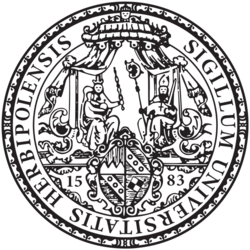Difference between revisions of "University of Würzburg"
Jump to navigation
Jump to search
m (Text replacement - "|twitter= " to "") |
(unstub) |
||
| Line 3: | Line 3: | ||
|logo=University of Würzburg.svg | |logo=University of Würzburg.svg | ||
|constitutes=university | |constitutes=university | ||
| − | |start= | + | |start=1402 |
| − | |headquarters= | + | |headquarters=Würzburg,Bavaria |
|type=Public | |type=Public | ||
|website=http://www.uni-wuerzburg.de/en/home/ | |website=http://www.uni-wuerzburg.de/en/home/ | ||
|motto=Veritati | |motto=Veritati | ||
| + | |description=University in Würzburg,Bavaria | ||
}} | }} | ||
| + | The '''Julius Maximilian University of Würzburg'''<ref name="juliusmaximilianname">http://www.uni-wuerzburg.de/en/ueber/university/</ref> (also referred to as the '''University of Würzburg''', in German ''Julius-Maximilians-Universität Würzburg'') is a public research university in [[Würzburg]], [[Germany]]. | ||
| + | |||
| + | After the [[Second World War]], the Allied military government dismissed 123 of the 150 professors who had worked before 1945 and only allowed 27 back to lecture at the university.<ref>Peter A. Süß: Die Entwicklung der Würzburger Hochschulen im 19. und 20. Jahrhundert. In: Ulrich Wagner (Hrsg.): Geschichte der Stadt Würzburg. 4 Bände, Band I-III/2, Theiss, Stuttgart 2001–2007; III/1–2: Vom Übergang an Bayern bis zum 21. Jahrhundert. Band 2, 2007, ISBN 978-3-8062-1478-9, S. 1312, Anm. 136.</ref> | ||
{{SMWDocs}} | {{SMWDocs}} | ||
==References== | ==References== | ||
{{reflist}} | {{reflist}} | ||
| − | |||
Latest revision as of 23:36, 13 March 2022
(University) | |
|---|---|
 | |
| Motto | Veritati |
| Formation | 1402 |
| Headquarters | Würzburg, Bavaria |
| Type | Public |
| University in Würzburg,Bavaria | |
The Julius Maximilian University of Würzburg[1] (also referred to as the University of Würzburg, in German Julius-Maximilians-Universität Würzburg) is a public research university in Würzburg, Germany.
After the Second World War, the Allied military government dismissed 123 of the 150 professors who had worked before 1945 and only allowed 27 back to lecture at the university.[2]
Alumni on Wikispooks
| Person | Born | Died | Nationality | Summary | Description |
|---|---|---|---|---|---|
| Hans Boden | 28 July 1893 | 17 November 1970 | Germany | Industrialist | Rhodes Scholarship German industrialist in Germany before, during and after WW2 |
| Joseph Goebbels | 29 October 1897 | 1 May 1945 | Germany | Politician Propagandist | Minister of Public Enlightenment and Propaganda under Adolf Hitler |
| Otmar Issing | 27 March 1936 | Germany | Economist | Triple Bilderberger European central banker who became "international advisor" for Goldman Sachs. | |
| Klaus Kleinfeld | 6 November 1957 | Germany | Businessperson | US/German businessman. Bilderberg steering committee, CFR, ERTI | |
| Heinrich Troeger | 4 March 1901 | 28 August 1975 | Germany | Central banker | German politician who attended the first and fourth Bilderbergs, then became Vice President of the Bundesbank |
| Theo Waigel | 22 April 1939 | Germany | Politician | German politician |
Many thanks to our Patrons who cover ~2/3 of our hosting bill. Please join them if you can.
References
- ↑ http://www.uni-wuerzburg.de/en/ueber/university/
- ↑ Peter A. Süß: Die Entwicklung der Würzburger Hochschulen im 19. und 20. Jahrhundert. In: Ulrich Wagner (Hrsg.): Geschichte der Stadt Würzburg. 4 Bände, Band I-III/2, Theiss, Stuttgart 2001–2007; III/1–2: Vom Übergang an Bayern bis zum 21. Jahrhundert. Band 2, 2007, ISBN 978-3-8062-1478-9, S. 1312, Anm. 136.